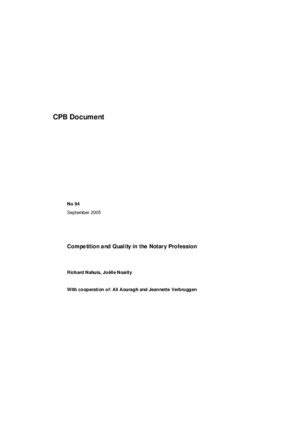Competition and quality in the notary profession
Doelstellingen liberalisering notariaat nog niet bereikt
We are sorry, unfortunately there is no English translation of this page.
We compare the level of competition before and after the liberalisation using two different indicators, namely a relative-profit indicator and a variation of the Bresnahan-Reiss indicator. Using the relative profit indicator, we find that the level of competition has increased after 1999. We find, however, no significant difference between the level of competition in 1996 and in 2002. This is particularly clear when we measure competition taking the local market as the relevant market for notary services. The results on the national market are more mixed and there is some evidence that competition in 2002 is higher than in 1996. Using the Bresnahan-Reiss indicator, we find that entry does affect conduct in the notary market, but again that the level of competition in the local market for notary services in 2003 does not significantly differ from the 1995 level.
We also examine whether competition affects the quality of notary services. We use both subjective and objective measures for quality of notary services. We find that subjective quality - the perceived level of service by clients - is, if anything, negatively affected by competition. Using objective quality, i.e. quality that is not observable to clients, we find that in 2003 competition leads to a deterioration of quality, as the quality of monopoly notaries outperforms the quality of oligopoly notaries. This was not the case in 1995. Confronting our empirical findings with qualitative insights, we present options for policy.
